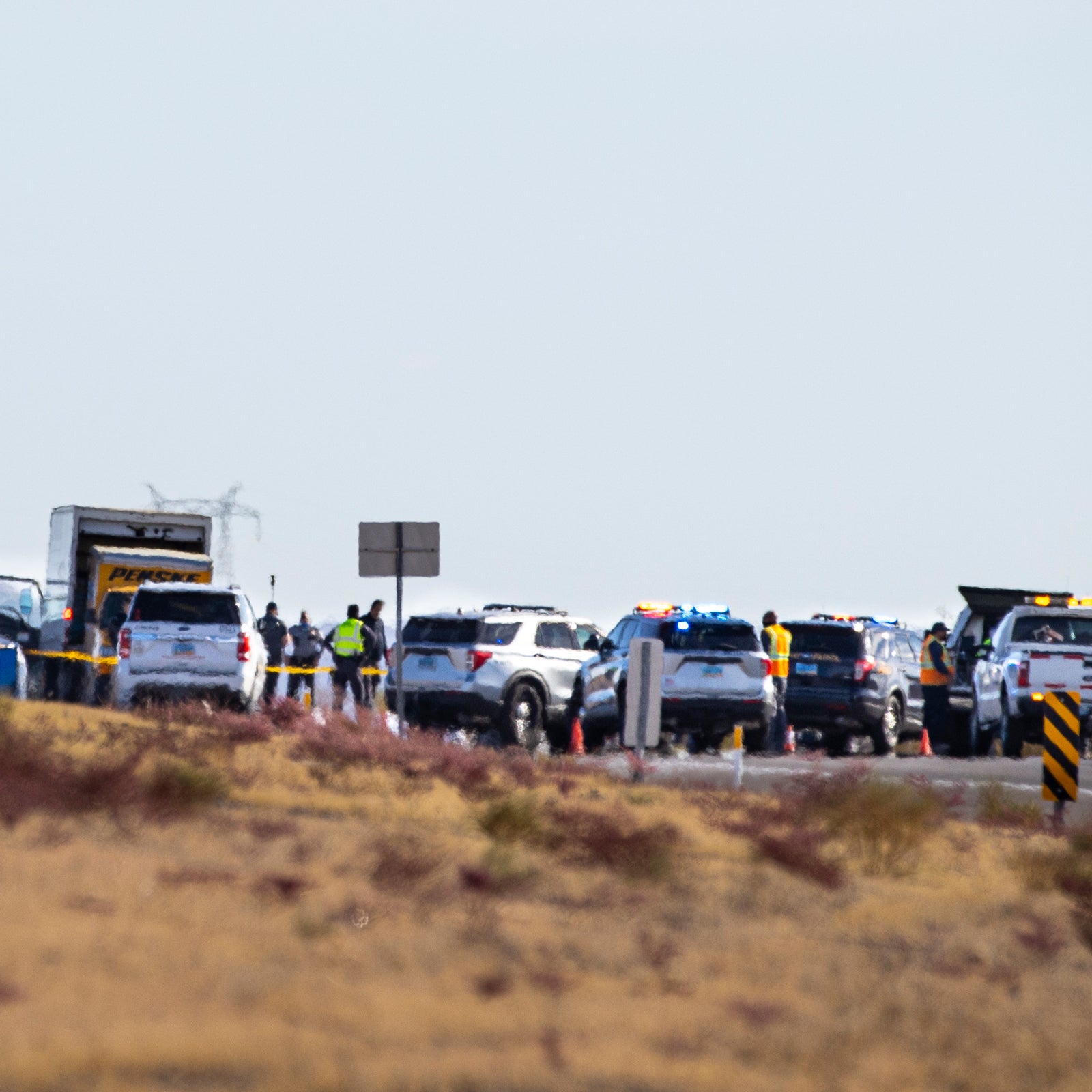On Thursday, December 10,��a driver named Jordan Barson����into a group of nearly 20 cyclists along U.S. Highway 95 south of Las Vegas,��leaving five of them dead. The horrific tragedy is eerily similar to another crash in Kalamazoo County, Michigan, on June 7, 2016, in which��a man named��Charles Pickett��Jr.��drove his pickup truck into a group ride, killing five members of a cycling club called the Chain Gang. Pickett was of driving under the influence of methamphetamine and other drugs and sentenced to a minimum of 40 years in prison.��Barson, who was reportedly delivering packages,��was����in his system and faces a host of DUI and reckless-driving charges.
As a society,��we’ve long been inured to reports of drivers picking off individuals��on bikes. They’re “accidents,” we tell ourselves, the unfortunate yet unavoidable consequences of living in a mechanized era of unprecedented convenience. As such, news stories about them rarely resonate beyond the local media. Crashes resulting in mass casualties like this one follow a different trajectory, but the end result is the same. Yes, in the moment, they transcend our tendency to rationalize and victim-blame, and they get national attention by virtue of their terrible scale. They also provide us an obvious villain, or at least someone to whom the rest of us can feel morally superior. Sure, I may text while driving once in a while, we tell ourselves, but I’d never do anything like that. Ultimately, the sentencing allows everyone��to move on, and we end up rationalizing it after all: it was a freak thing, justice was served, and nothing else needs to change.
Sure, may I text while driving once in a while, we tell ourselves, but I’d never do anything like that.
Bike advocates know differently. They understand the perniciousness of They recognize the degree to which police and the media assume guilt on the part of the cyclist��and the extent to which��America’s��car-centric infrastructure and traffic laws can make doing the “correct” thing while on a bike dangerous or even . They take cold comfort when a meth-addled driver is charged for killing five people, because they know . (When driving, pretty much anything goes,��as long as you’re sober.) To shock people out of their complacency��and make sure the names of the victims don’t just fade away, they��amplify all those easily ignored local news stories in order to expose the hypocrisy of a public that condemns people for driving under the influence but accepts other reckless driving behavior. They gather for —not just to honor the dead��but to express outrage and foment change.
As a cyclist, I feel each one of these stories viscerally, whether it’s five riders in Nevada or . I’ve railed against the auto-centric attitudes that have contributed to these deaths, in this publication and elsewhere, in hopes of diminishing the likelihood that people on bikes will continue to die. Yet I’ve also wondered if people consider the tragedies and the outrage and draw what might seem like a perfectly sensible conclusion: “Well, that settles it, I’m never riding a bike again. And my kids will never ride one either.” I’ve also begun to assess the impact this outrage has on my own emotional well-being.
According to , it’s clear that fear keeps people away from bikes: 47 percent of adults in the United States would like to ride more often, but 50 percent of them are worried about getting hit by a car. (This was borne out during the pandemic; when car traffic temporarily disappeared in American��cities, .) There’s also no shortage of cultural cues to reinforce your decision to not ride a bike, even if you’re interested in doing so, from zero percent APR car deals to rabid anti-bike op-eds to that well-meaning family member who’s concerned for your safety. Yet there’s a growing consensus that . Furthermore, , and certainly anyone who advocates for bikes does so because they want as many people as possible to share in the joy of riding them. Riding bikes involves a certain element of danger—as do��skiing or walking or taking a shower—but it’s not remotely a death sentence, and it’s far more likely to give you a new lease on life. So it’s a tragedy of a different sort if our well-intentioned outrage ends up being just another voice reminding people that bikes are “too dangerous.”
Riding bikes involves a certain element of danger—as do��skiing or walking or taking a shower—but it’s not��remotely a death sentence, and it’s far more likely to give you a new lease on life.
Even those of us who have been riding for years, who are willing to toe the line with drivers day after day, and who would keep on riding even if the streets were flowing with molten lava (what’s a good tire tread for lava��anyway?) can fall prey to the deleterious effects of incessant outrage. Spend a couple hours on the bike, and��while you may or may not have a negative encounter with a motorist, you’ll almost certainly finish the ride feeling happier than when you started it. Spend a couple hours reading bike Twitter, and you’re guaranteed to wind up despondent, infuriated, and profoundly disgusted with humanity. Moreover, you’ll then take that disgust along with you on your next ride. And��when you feel contempt for your fellow humans, I’ve found that��negative encounters with them have a funny way of multiplying. It’s one thing to hope for the best and prepare for the worst, but when you assume the worst of everyone, you’re sure to get it.
This doesn’t mean we get to rationalize the horror stories. We need to acquaint ourselves with them intimately, vividly imagine the final moments of the victims, and, most important, contemplate the actions of the drivers that led to these outcomes. Those of us who live for cycling also need to know that every ride could be our last, but instead of��letting that serve as a source of outrage��or��fear, we should use it as a source of determination to keep our outrage from overtaking��our love of��the sport or undermining��the manner in which we share that love with others. When we ride, death rides with us, whether we invite it along or not. Fortunately, understanding this makes it less likely it will take us, because when we recognize death as a riding partner, we take more care to ride confidently and defensively. Anger and fear also ride with us, but the difference is that we invite them along. When they join the paceline,��they cross wheels and ride erratically. Death is paradoxically inscrutable yet unequivocal, but anger and fear are just squirrelly. They ruin every ride, and they’ll always take you down.


